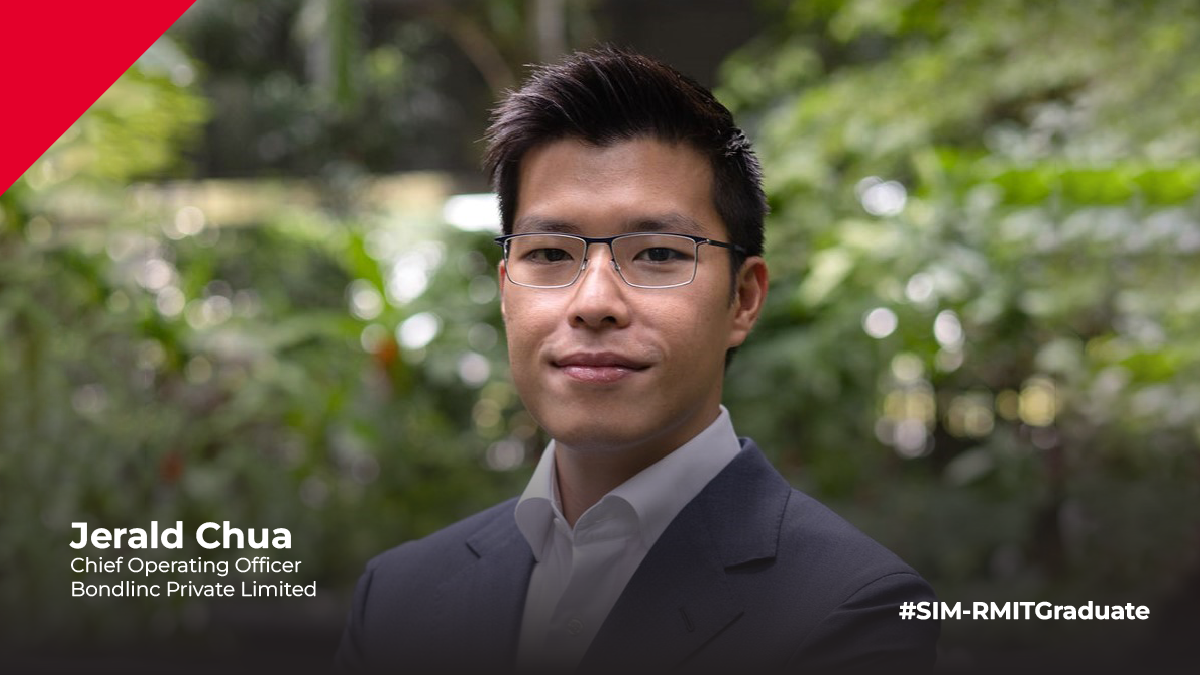Jerald Chua
Pursuing a part-time degree while working full-time was never easy but Jerald Chua did that and found that his economics and finance degree from RMIT University was actually very relevant and applicable to his work. Jerald’s career started in the financial industry in 2013. He joined Bondlinc, a FinTech solutions provider, as a Fixed Income Associate in 2017 and progressed to his current position of Chief Operating Officer in 2020.

Briefly share with us your career path.
I am currently the Chief Operating Officer of Bondlinc. We are a fixed income wealth management solutions provider that caters to private banks and brokerage firms. Our clients include tier 1 financial institutions such as BNP Paribas, Credit Suisse, Julius Baer, Pictet and Bank of China amongst several others.
My path into the FinTech space was purely a coincidental one. I started my career in the financial industry where I worked in treasury doing commercial foreign exchange, risk management at Standard Chartered and was subsequently at J.P. Morgan Private Bank.
I founded a technology company while working at J.P. Morgan, which gave me a very good insight into the tech industry. Looking back, I believe it was a culmination of factors — running my own start-up, being able to speak tech and having exposure to the financial industry — which subsequently put me in a favourable position to be solicited into Bondlinc when I was in the third year of my part-time degree.
Can you share more on your current role?
My role requires me to maintain oversight of the Singapore, Hong Kong, Taiwan and India markets, working closely with our clients to help them fulfil their regulatory trade and pre-trade obligations, as well as to improve their bond sales and trading efficiency by empowering them with data-driven insights.
A typical day for me largely revolves around my product/technology and business teams, whom I strategise with on the development pipeline and business updates. In addition to that, I liaise on a daily basis with key decision makers (C-suite or head of function) in financial institutions in helping them streamline their processes for enhanced operational and market efficiency. This is all achieved through the means of digital transformation and change management that would help them drive positive business results.
As a COO, I am also responsible for shareholder reporting, business forecasting, budgeting and sales. My work spans across various facets of the business, which I really enjoy as it ensures that I am always kept challenged!
Can you provide us with 1 to 2 success stories in your current job where you had to overcome a specific challenge?
I recall some years ago when we reached a point where our runway was far shorter than anyone would have been comfortable with. This was also the very first task I looked at when I took over the reins as the Head of Operations and it caused the management team and I a great deal of concern.
We banded together as a company and structured a development strategy for Asia, which was surgically executed and we were able to attain 1.7x growth in that very first year.
We succeeded in rebalancing our finances and reduced our OPEX by 47 per cent, while increasing our revenue by more than 300 per cent - all these factors contributed to the extension of our runway by at least 10 times. The icing on the cake, however, was when we clinched an endorsement by the Private Wealth Management Association in Hong Kong as the go-to solution for fixed income product due diligence, making us the only fixed income company to be industry endorsed.
What was the main challenge you faced in your career?
I believe one of the most prominent challenges I faced during the course of my career is staff attrition. A role in a start-up company is fast-paced with high exposure, which may not conform to everyone’s preferences or lifestyle. We tend to hear about culture and how that influences attrition, while that is not wrong, I find that culture is not the main underlying attribute; in fact, there is no one-size-fits-all solution.
I’ve come to realise that an individual has to feel challenged, has to be heard, has to be actively involved and informed, but above all the individual needs to see the value in his or her work and the value it confers to the entity. The work that is constantly being asked of the individual should enrich and enhance one’s skills and knowledge to help prepare him or her for the future and not regression. I believe people leave once they fail to see the value of what they or the company can offer.
How has the economics and finance programme that you studied in SIM benefitted you?
The programme exposed me to real world problems and equipped me with the necessary skill sets and knowledge that I would eventually need in the course of my professional career. As a part-time student, I was able to immediately appreciate the benefits and the need for them while I was undertaking my degree; I was literally applying concepts being taught in class the very next week or even the next day at work!
The programme at SIM also geared me for the future that I never knew I would be exposed to. Modules such as contract law or accounting which I never felt were necessary (if I were to be completely honest, probably even felt they were redundant at some point in time) are actually directly relevant and required in the course of my current work as a COO. I am definitely grateful for the exposure to such a comprehensive curriculum.
You have been mentoring Young NTUC youths and SIM-RMIT students. Can you share what motivates you to mentor the youths, and your experiences thus far?
You are right, I have volunteered as a mentor for RMIT University and Young NTUC for quite some time now. I have been through quite a fair bit of life events; I was brought up in a single-parent family by my Mom, who very unfortunately passed when I was 19. I lacked the guidance I needed at a pivotal time in my life, felt lost and helpless and was forced to find myself. Those were very trying times for me, but I am glad I was fortunate to be able to eventually come out of those experiences as a better version of myself.
I believe everyone should have an avenue to receive guidance as long as he or she makes the effort to seek that out. I would never want anyone to feel lost or helpless, as I did, and so I try my best to give back. Through mentoring, I hope to be able to empower more individuals to leverage their experiences to propel them forward in life. I always tell my mentees that success is heavily predicated on their ability to bounce back from challenges - the earlier they learn to reset their attitude after a setback, the better it will be for them.
Posted online 20 Jul 2022.
Learn more about the programmes offered by RMIT University at SIM today.
